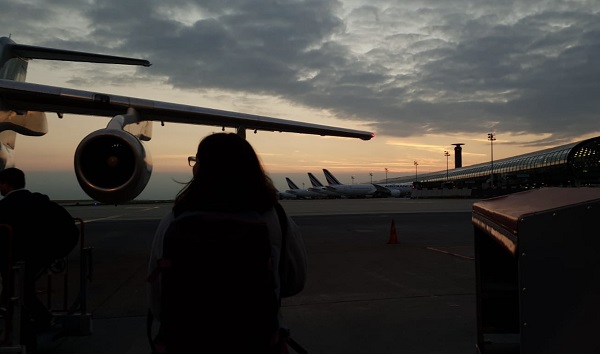 Credit: © Claire Schroeder
Credit: © Claire Schroeder
In the latest in a series of articles about current conservation issues, experts at natur&ëmwelt, a leading conservation NGO in Luxembourg, spoke to Chronicle.lu about how to travel sustainably.
Natur&ëmwelt volunteer Claire Schroeder helped collect the relevant information from the NGO for this article.
As summer (hopefully) rolls around and the usually busy streets clear up a bit, it is clear that the travel season is upon us.
Chronicle.lu: Would you not agree that travel is inherently good for us and important?
Natur&ëmwelt: One could argue that there are many lies to unlearn when it comes to travel - and it being "good" is one of them. In our culture, travel is often presented as a way to learn about oneself (think gap year) and to learn about other places and cultures (think… neocolonialism?). Granted, phrasing it like that is extreme and might ruffle some feathers, but perhaps each of us should be taking a hard look in the mirror and thinking about why we feel the need to travel, why "travel" and "holidays" are often used interchangeably and why we feel the need to recount it all on Instagram afterwards. How much of our travel is generated by true curiosity and research, and how much is generated by our insecurities of missing out and trying to escape the rat race of everyday life?
Chronicle.lu: There is value in changing your surroundings though, surely?
Natur&ëmwelt: Absolutely! "Getting away" is something most people feel the need to do from time to time. However, this doesn't need to mean jetting off to some tropical destination halfway around the world. If the COVID-19 pandemic taught us anything, it's that there is value to be found in our own backyards. Especially in Europe where most borders are easily crossed, and most countries are well linked. Whether by car, bus or train, there's a whole world of possibilities to explore new places in sustainable ways.
Chronicle.lu: How bad is flying really?
Natur&ëmwelt: The European Commission found that a return flight between Lisbon and New York generates roughly the same level of emissions as the average person in the EU does by heating their home for a whole year. Between 1990 and 2019, carbon emissions from aviation more than doubled according to the International Energy Agency. The COVID-19 pandemic then saw those numbers plummet by nearly half due to international travel restrictions. Despite this, it is predicted that emissions due to aviation will surpass 2019 levels within the year. And carbon emissions are not even the only problem here. Vapor trails from plane exhausts are also hugely problematic for climate deregulation.
Chronicle.lu: So, should people never fly again?
Natur&ëmwelt: Honestly, if you currently don't fly and it doesn't bother you, perfect. If you do fly, again, moderation. The biggest problem in aviation are what are known as ghost flights - aircrafts that are flying around the world empty, or close to empty, just to preserve landing slots. At big hub airports, losing landing slots to competitors is simply unacceptable from a business stand-point to most (frankly, all) airlines. That, and those who fly often, for distances that could be covered by other means. Like in most cases, choosing how you travel is an opportunity to vote with your money. Policymakers are working in a positive direction, no doubt about it. The Civil Aviation Organization for instance has set a goal of net zero carbon emissions from international aviation by 2050 and the European Parliament and Council have voted for a new obligation for fuel suppliers to blend more sustainable fuels. However, the increase in aircraft passengers is unfortunately close to nullifying this process.
Chronicle.lu: What are some practical things one can do to travel more sustainably?
Natur&ëmwelt: The simplest motto you can go by, like in most areas in life, is moderation. There's no need to give up on travelling completely - far from it. However, perhaps you don't need to go quite as often, or quite as far. Focus on public means of transport with lower CO2 emissions such as the train, bus or even car in some cases. Travel slower. Pick destinations that you are interested in and spend a little longer there. Focus on the conversations you have rather than the photos you are taking. Culture is not a commodity, it is not there to entertain or to be reviewed.








